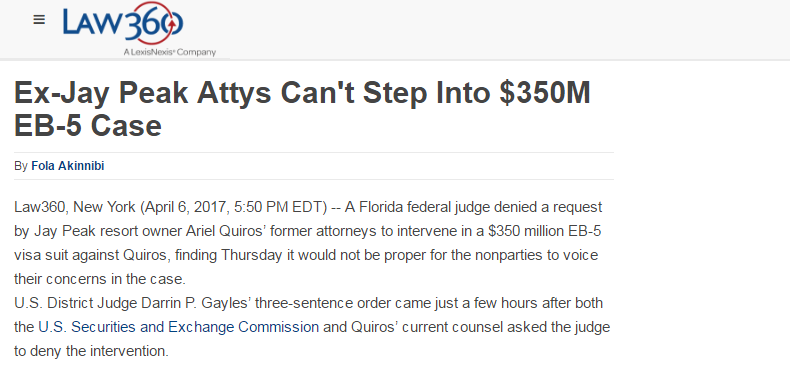A Florida federal judge denied a request by Jay Peak resort owner Ariel Quiros’ former attorneys to intervene in a $350 million EB-5 visa suit against Quiros, finding Thursday it would not be proper for the nonparties to voice their concerns in the case.
U.S. District Judge Darrin P. Gayles’ three-sentence order came just a few hours after both the U.S. Securities and Exchange Commission and Quiros’ current counsel asked the judge to deny the intervention.
Quiros’ former lawyers had sought the clarification or modification of an asset freeze to ensure that the resort owner’s receipt of proceeds from an insurance policy to pay attorneys' fees did not violate the freeze. In a Thursday response, the SEC claimed that the former lawyers had withdrawn their motion addressing that issue while they were still representing Quiros, meaning they could not go back now. At this point, it seemed that the former attorneys were looking to have the court authorize a payment to them under the insurance policy, which was improper given the fact they are not parties to the suit, the agency argued.
Quiros' current lawyers filed their own response Thursday, following the SEC’s argument and asking the court to deny the intervention bid, according to court documents.
Judge Gayles acknowledged the fact that the court set aside proceeds for Quiros to pay his attorneys, but sided with the agency and current attorneys in finding that this was not the forum to handle an issue over fees.
“The court does not find it appropriate to resolve a private attorneys' fee issue between Quiros and his prior counsel in this action,” the order said.
The former lawyers did not immediately respond to a request for comment Thursday. The SEC does not comment on pending litigation.
The SEC suit accuses Quiros and Jay Peak CEO William Stenger of misappropriating the bulk of $350 million raised from investors hoping to obtain visas through the EB-5 program, which provides green cards to foreign nationals who invest in job-creating American businesses.
Last year, the court froze Quiros' assets, including a Miami condo and the resort, and placed them in a receivership under the control of Akerman LLP’s Michael I. Goldberg days after the SEC unveiled its fraud suit against Quiros and Stenger.
A trial is scheduled in the case for Sept. 17, 2018.
The government is represented by Robert K. Levenson and Christopher E. Martin of the U.S. Securities and Exchange Commission.
Quiros is represented by David B. Gordon and John S. Durrant of Mitchell Silberberg & Knupp LLP and Scott B. Cosgrove and James R. Bryan of León Cosgrove LLC.
The case is Securities and Exchange Commission v. Quiros et al., case number 1:16-cv-21301, in the U.S. District Court for the Southern District of Florida.
https://www.law360.com/articles/910779/ex-jay-peak-attys-can-t-step-into-350m-eb-5-case
Mentions
- Vermont EB5 Regional Center
- UNITED STATES SECURITIES AND EXCHANGE COMMISSION
- Akerman LLP
- Ariel Quiros
- Bill Stenger
Litigation Cases
- State of Vermont vs Bill Stenger & Ariel Quiros
- UNITED STATES SECURITIES AND EXCHANGE COMMISSION vs Ariel Quiros & Bill Stenger
States
- Vermont
Securities Disclaimer
This website is for informational purposes only and does not constitute an offer or solicitation to sell shares or securities. Any such offer or solicitation will be made only by means of an investment's confidential Offering Memorandum and in accordance with the terms of all applicable securities and other laws. This website does not constitute or form part of, and should not be construed as, any offer for sale or subscription of, or any invitation to offer to buy or subscribe for, any securities, nor should it or any part of it form the basis of, or be relied on in any connection with, any contract or commitment whatsoever. EB5Projects.com LLC and its affiliates expressly disclaim any and all responsibility for any direct or consequential loss or damage of any kind whatsoever arising directly or indirectly from: (i) reliance on any information contained in the website, (ii) any error, omission or inaccuracy in any such information or (iii) any action resulting therefrom.




